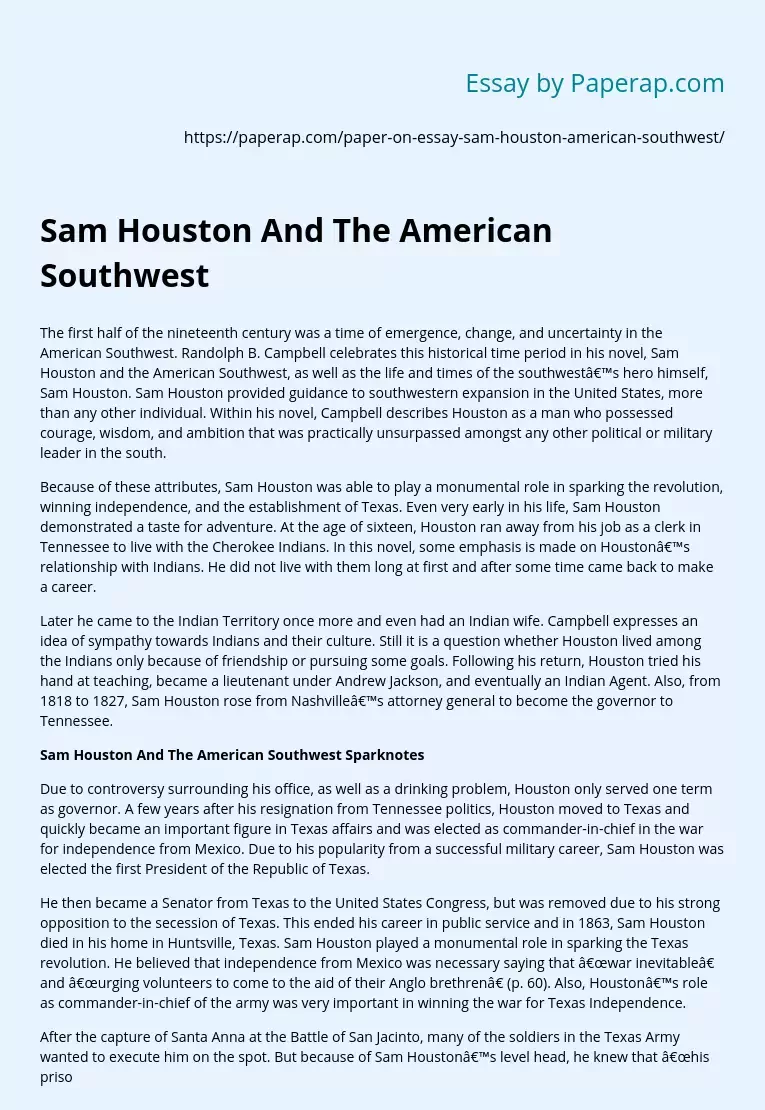The first half of the nineteenth century was a time of emergence, change, and uncertainty in the American Southwest. Randolph B. Campbell celebrates this historical time period in his novel, Sam Houston and the American Southwest, as well as the life and times of the southwest’s hero himself, Sam Houston. Sam Houston provided guidance to southwestern expansion in the United States, more than any other individual. Within his novel, Campbell describes Houston as a man who possessed courage, wisdom, and ambition that was practically unsurpassed amongst any other political or military leader in the south.
Because of these attributes, Sam Houston was able to play a monumental role in sparking the revolution, winning independence, and the establishment of Texas. Even very early in his life, Sam Houston demonstrated a taste for adventure. At the age of sixteen, Houston ran away from his job as a clerk in Tennessee to live with the Cherokee Indians. In this novel, some emphasis is made on Houston’s relationship with Indians.
He did not live with them long at first and after some time came back to make a career.
Later he came to the Indian Territory once more and even had an Indian wife. Campbell expresses an idea of sympathy towards Indians and their culture. Still it is a question whether Houston lived among the Indians only because of friendship or pursuing some goals. Following his return, Houston tried his hand at teaching, became a lieutenant under Andrew Jackson, and eventually an Indian Agent.
Also, from 1818 to 1827, Sam Houston rose from Nashville’s attorney general to become the governor to Tennessee.
Sam Houston And The American Southwest Sparknotes
Due to controversy surrounding his office, as well as a drinking problem, Houston only served one term as governor. A few years after his resignation from Tennessee politics, Houston moved to Texas and quickly became an important figure in Texas affairs and was elected as commander-in-chief in the war for independence from Mexico. Due to his popularity from a successful military career, Sam Houston was elected the first President of the Republic of Texas.
He then became a Senator from Texas to the United States Congress, but was removed due to his strong opposition to the secession of Texas. This ended his career in public service and in 1863, Sam Houston died in his home in Huntsville, Texas. Sam Houston played a monumental role in sparking the Texas revolution. He believed that independence from Mexico was necessary saying that “war inevitable” and “urging volunteers to come to the aid of their Anglo brethren” (p. 60). Also, Houston’s role as commander-in-chief of the army was very important in winning the war for Texas Independence.
After the capture of Santa Anna at the Battle of San Jacinto, many of the soldiers in the Texas Army wanted to execute him on the spot. But because of Sam Houston’s level head, he knew that “his prisoner was the key to removing all Mexicans soldiers from Texas without further bloodshed”, and “Jacinto became his password to Texas heroism forever” (p. 85-87). Furthermore, Houston’s leadership as the president of the Republic of Texas “kept the republic alive until it became a part of his mother country” (p. 98). Sam Houston was a man of many faces. Whether it was a friend to the Indians, governor of two States, or president of the Republic of Texas, he always stayed true to his practicality and fought for what was right. Because of this Sam Houston’s name will synonymously remain with Texas Independence, and forever be immortalized in textbooks and novels alike. In conclusion, Randolph B. Campbell succeeds in making this story an easy to read page-turner, drawing the reader in to the events at hand.
Where he fails is presenting only one side of a controversial man involved in complex events. One should expect more from a biography. It should inform the reader of multiple sides of the man and the issues. Despite being compelling to read, Campbell comes across as a modern Stuart N. Lake presenting us with a cross between a movie script and propaganda. He does however strengthen the case for the place Texas holds in Western History earning the volume some place in Western Historiography. Still it is a good intro to Texas independence, annexation and Houston himself.
Sam Houston And The American Southwest. (2019, Dec 05). Retrieved from https://paperap.com/paper-on-essay-sam-houston-american-southwest/

